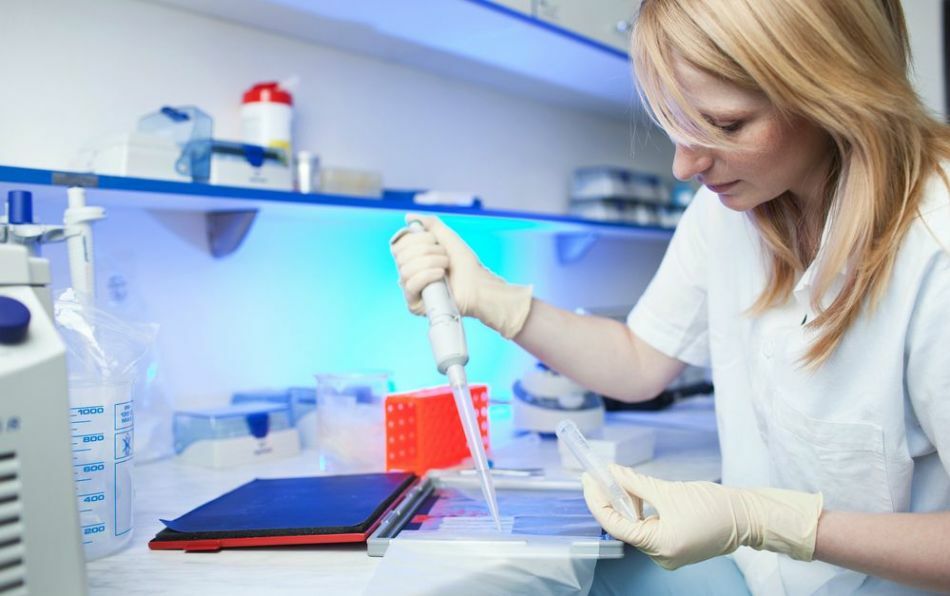What compulsory tests should a woman take when planning a pregnancy? What additional tests can be used to plan pregnancy? What tests do you need to take to men?
Contents
- Mandatory tests for pregnancy planning, list of
- What tests should I give to a woman when planning a pregnancy?
- Where is it better to take tests while planning pregnancy?
- Genetic analysis of blood in pregnancy planning
- Compatibility assays in pregnancy planning
- Rubella test for pregnancy planning
- Hormone tests for pregnancy planning
- Analgesies when planning a pregnancy for a man
- What tests should I take when planning a second pregnancy?
- Analgeses in pregnancy planning: tips and reviews
- Video: Pregnancy planning
The birth of a child is a very serious and responsible step. Therefore, you need to prepare thoroughly for it. Today, many married couples prepare in advance the foundation for the expansion of their family and the arrival in their lives of a tiny baby. Specifically for such responsible parents, family planning centers are established.
In such centers, expectant mothers and dads are taught how to properly prepare for pregnancy, what tests to leave on the day before, and what studies to take. In this article, we will try to answer all these questions on our own, and help spouses plan future motherhood and paternity.
Required tests for pregnancy planning, list of
 List of tests for the planning of pregnancy
List of tests for the planning of pregnancy The mandatory analyzes in preparation for pregnancy include:
- Bacteriological seeding on the flora
- PAP test for the cytology
- Smear for sexual infections
- General blood test
- General urine analysis
- Blood test for determination of blood group and Rh factor
- Blood sugar analysis
- Biochemical blood test
- Blood test for infection
- Analysis for TORCH infection
- Colposcopy
- Coagulogram
- Ultrasound of the small pelvis
What tests should I give to a woman when planning a pregnancy?
 What do I need to take tests for a woman while planning a pregnancy?
What do I need to take tests for a woman while planning a pregnancy? Now we will examine specifically each of the main analyzes, and also we will dwell on additional analyzes, which are assigned if necessary.
- Bacteriological seeding is performed by taking a smear from a woman's vagina to detect the condition of the microflora and to detect the pathogens in it. Such an analysis is conducted, both in private laboratories and in women's consultations.
- A smear on cytology is taken from the cervix directly in the gynecological chair. The PAP test allows you to identify cancer cells or cells located on it on the surface of the cervix
- A smear for sexual infection will help to identify hidden diseases caused by bacteria that are sexually transmitted( candidiasis, chlamydia, gonorrhea, papillomavirus, ureaplasmosis, etc.)Such infections can disrupt the normal course of pregnancy, provoke premature birth or miscarriage, and significantly inhibit the development of the fetus
- An overall blood test is assigned to identify inflammations and diseases in the body,e emitted bright symptoms. A general blood test is always performed on an empty stomach
- Urinalysis can reveal hidden diseases or infections of the urinary system, which can also have a negative effect on pregnancy. Urine for analysis is collected with the first morning trip to the toilet in a special container or a glass jar( sterilized).Before collecting the analysis, it is necessary to wash thoroughly and it is desirable to close the entrance to the vagina with fleece to avoid getting foreign mucus into the container.
- . The blood test for the determination of the Rh factor is mandatory, since only he can identify a possible Rh-conflict. This is a phenomenon when the mother has a negative Rh, and the fetus has a positive one. In this case, the woman's body begins to produce antibodies to the red blood cells of the baby's future. Thus, the rejection of the fetus occurs. Blood for Rhesus analysis is taken from the vein
- A blood sugar test is performed to identify a woman with diabetes mellitus. Blood sugar should be taken on empty stomach
- Biochemical blood test allows to create a complete picture of the woman's health status( functioning of her systems and internal organs)
- A blood test for infection helps to identify diseases such as HIV, AIDS, Syphilis, Hepatitis B and C
- Analysison TORCH-infection allows you to identify the most serious infections in the body of a woman, dangerous for pregnancy - rubella, toxoplasmosis, herpes, cytomegalovirus and other viruses. The fact is that it is these viruses that can harm a pregnancy and in particular a baby. Often, they provoke miscarriages, premature birth, as well as the development of deformities and pathologies of the fetus.
- Colposcopy is a diagnostic method for examining the cervix and vagina with the help of a special device - the colposcope. Such an examination, as a rule, is appointed with poor analysis of cytology or the detection of erosion of the cervix by a gynecologist while visually examining it. Colposcopy allows you to more closely examine the condition of the walls of the vagina and the walls of the uterus and to identify the presence of any diseases. Colposcopy - absolutely safe and painless procedure
- Coagulogram is a blood test for clotting. Such a study is extremely important in order to avoid the continuing bleeding after delivery of
- . The pelvic ultrasound can judge the condition of the female genitalia and their willingness to bear a child.
In some cases, a woman may be assigned additional studies related to long attempts to conceive or unsuccessful previous pregnancy(hormonal, genetic tests or compatibility tests).
Such studies are quite expensive today, however, in any case, their purpose is of great help, and couples should better listen to the doctor's recommendations regarding their surrender.
Where is it better to take tests when planning a pregnancy?
 Where to take tests when planning a pregnancy?
Where to take tests when planning a pregnancy? - Many tests can be taken at women's clinics, maternity hospitals or public medical institutions. In such institutions, the delivery of tests will be much cheaper than in private clinics. In addition, the results of such studies are considered as accurate and error-free
- If desired, you can take tests in private clinics and laboratories. In this case, research will cost much more. Yes, many commercial establishments boast of the latest equipment and equipment. However, very often their results are not listed in state institutions, as they are either not licensed or over sensitive, which sometimes prevents you from seeing a clear picture of the patient's health
- In general, the choice is always yours. If you are confident in the reputation of a private medical institution or clinic, you can contact them. If there is no absolute certainty or there are bad rumors about the institution, it is better to take tests at the state institution
Genetic analysis of blood in pregnancy planning
 Genetic analysis in preparation for pregnancy
Genetic analysis in preparation for pregnancy - Genetic analysis of blood is assigned to married couples in order to exclude the risks of miscarriage or birthkid with deviations
- Such analysis includes general clinical studies such as biochemical blood test and consultation of a neurologist, endocrineord and
- therapist In some cases, spouses may be appointed HLA -tipirovanie( compatibility analysis)
- Before assigning such studies, with a pair of holding a conversation doctor geneticist. In the course of the survey, he reveals the presence of genetic diseases in the genealogy of future parents, chronic or other serious illnesses in them and their immediate relatives, their state of health.
 Who is recommended to take genetic tests?
Who is recommended to take genetic tests? There are several categories of couples that most need genetic analysis:
- those couples whose families have severe hereditary diseases
- spouses who have not yet reached the age of 18 or spouses who are already in the 35
- women who have an abnormal history of miscarriagesor the frozen pregnancies
- spouses whose previous children were born with certain pathologies or deformities of
- are those couples who for a long period of time can not become pregnant
- spouses who are close relatives of dry friend
In the process of genetic analysis, the level of risk of the birth of an unhealthy child is deduced. If the risks are less than 10%, then parents should not worry, because the likelihood of various pathologies in their baby is very small.
If the risks fluctuate from 10 to 20 percent, the baby can equally be born, both healthy and not completely healthy. If the risk exceeds the border of twenty, the doctor may advise the couple to use the services of a sperm bank or a donor egg. However, there are cases when even at too high risks the baby is born absolutely healthy.
Compatibility Analyzes for Pregnancy Planning
 Compatibility Analyzes
Compatibility Analyzes - Some couples should be tested for compatibility, or so-called, HLA-typing on the eve of pregnancy. This procedure involves comparing the same HLA male and female
- HLA is the human leukocyte antigen. At everyone it is individual. The main function of this antigen is to detect foreign bodies in the body and block them. That is, if HLA has detected any infection or virus, it immediately commands the body to produce special antibodies to fight the threat of
- . In the process of conception, the future baby gets not only the mother's antigens, but also the father. Therefore, the fetus for the woman's body is also an alien body. At the onset of pregnancy, HLA recognizes the paternal HLA and perceives it as something alien. Thus, the female body begins to produce antibodies that can withstand the danger. These antibodies protect the placenta and fetus from the rejection of
- There are cases, especially if the spouses are blood relatives, when the human leukocyte antigens of a woman and a man are very similar. In such situations, female HLA does not recognize male HLA as something foreign, and antibodies are not produced. Then the mother's body starts to reject the fetus, and it dies
 Who is being tested for compatibility in pregnancy planning?
Who is being tested for compatibility in pregnancy planning? The pair compatibility test is usually assigned in such cases:
- when a pair of a long period of time fails to conceive a child
- when all previous pregnancies end in miscarriages or fetal death of the fetus
- when the spouses are close relatives
Rubella test for pregnancy planning
 Analysison rubella when planning pregnancy
Analysison rubella when planning pregnancy - Rubella test is included in the complex analysis for TORCH-infection. Rubella is a disease that can adversely affect the development of the fetus during pregnancy or cause its death.
- According to the results of the analysis of rubella, it is possible to judge whether this disease is dangerous for a future pregnancy. If the analysis reveals that a woman has antibodies to the rubella virus in her blood, then she can be pregnant and not be afraid of this disease. If it turns out that there are no such protective antibodies, then it is desirable to instill a future mother from rubella
- . In the analysis of rubella, two types of immunoglobulins IgG and IgM can be found. The presence in the blood of a woman immunoglobulin IgM suggests that in her body there is this virus. IgG antibodies suggest that a woman once faced rubella( hurted or grafted from her), and her body is protected from infection. If the same immunoglobulin is absent, then the woman never contacted the virus at all, and she does not have the immunity against it.
Hormone tests for pregnancy planning
 Hormone tests for the planning of pregnancy
Hormone tests for the planning of pregnancy Hormone tests are designed to describe the state of the hormonal background in the bodywomen and identify a deficiency or an overabundance of a hormone. For the planning of pregnancy, the levels of the following hormones are very important:
- progesterone is the hormone responsible for pregnancy
- testosterone is a male hormone whose high level in the female body is able to actively prevent pregnancy or its normal course.
- estradiol is the hormone responsible for the uterus's ready for pregnancy.
- FSH( follicle-stimulating hormone) - a hormone responsible for the development of the follicle
- LH( luteinizing hormone) is the hormone responsible for the maturation of the eggin the follicle and for the formation of the yellow body
- DEA-sulfate( dehydroepiandrosterone)
- Prolactin is the hormone responsible for ovulation and the production of milk for breastfeeding
- T3( triiodothyronine)
- T4( thyroxine)
- TTG( teriotropic hormone)
 Hormonal tests forplanning of pregnancy
Hormonal tests forplanning of pregnancy Hormonal studies are usually prescribed to women during pregnancy planning in the following cases:
- if the couple can not become pregnant over a long period of time( more than a year)
- if the woman is over 35 years old
- with an irregular menstrual cycle
- if the woman has an elevated level of male hormones( body hair, obesity or acne by male type) if
- a woman with an anamnesis has miscarriages and a frozen pregnancy.
Blood for analysis on hormones is taken from the vein.
Analyzes when planning a pregnancy for a man
 Analyzes for men in the planning of pregnancy
Analyzes for men in the planning of pregnancy When planning pregnancy, not only a woman will have to undergo a series of studies. A man will also need the surrender of some tests. Here is their list:
- general blood test - allows to detect the presence of inflammatory processes in the male body
- general urine test - indicates urinary system diseases
- blood test for infection - HIV, syphilis and hepatitis B and C analysis
- blood test for determinationRhesus factor - allows to exclude the rhesus-conflict
- fluorography - to exclude tuberculosis. Also, the results of X-rays may be needed for a man in the birthplace if he decides to attend the births of
 Additional tests for men in the planning of pregnancy
Additional tests for men in the planning of pregnancy In addition to the above tests, other additional tests may be prescribed if necessary:
- biochemical blood testmay be prescribed when a high blood sugar level is detected
- hormonal analyzes can be prescribed in case the couple does not get pregnant for a long time, and all womenanalyzes - OK
- ECG is assigned to men over 40
- Ultrasound of the organs of the peritoneum and chest can be prescribed for men with poor health
- spermogram is assigned to the spouse when his woman is absolutely healthy and the conception does not occur
- tests for sexual infections are shown inif any have been found in a woman
- prostate secretion studies can be prescribed if a man is suspected or has problems with the prostate
What tests must be takenwhen planning a second pregnancy?
 Analyzes when planning a second pregnancy
Analyzes when planning a second pregnancy - If the first pregnancy was successful, the baby was born healthy and during the time before the second pregnancy, none of the future parents was significantly ill, then when planning the second pregnancy, you can only pass the mandatory tests specified in the first paragraph of the article. The analysis on the Rh factor can be ignored if
- at the moment of planning the second pregnancy, the future parents have reached 35 years old, have fallen ill with some serious diseases, the woman has a history of miscarriages, frozen pregnancies, stillborn children or children with pathologies,to the local gynecologist for advice. Perhaps in this case it will be necessary to pass additional tests and studies( genetic, compatibility, hormonal, etc.)
Analgeses in the planning of pregnancy: advice and feedback
 Proper planning of pregnancy
Proper planning of pregnancy - Young people who are faced with the problem of getting pregnant or those who were bornnot absolutely healthy children, recommend to future parents not to ignore the stage of preparation for pregnancy. For its own peace and well-being, it's better to pass even mandatory tests before pregnancy. Their results can save couples from unsuccessful attempts and desperation, as well as from anguish and empathy to their sick child.
- . As for the financial side, almost all mandatory tests can be taken for free or at a symbolic price in state institutions. Therefore, unnecessary costs planning pregnancy does not require, but will save a lot of money and nerves in the future
